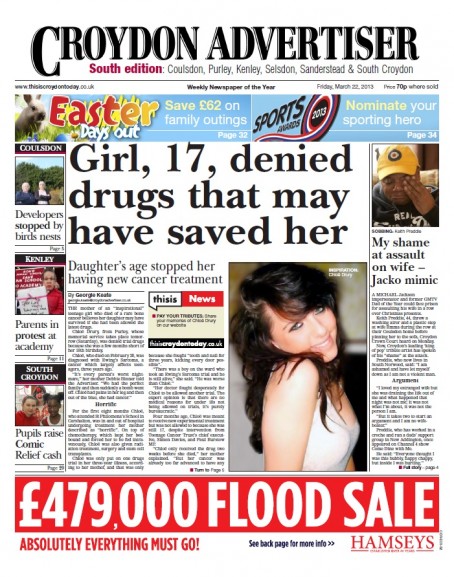 A weekly’s campaign to scrap red tape surrounding medical trials will go before Parliament this week, following the death of a teenager who was denied potentially life-saving treatment.
A weekly’s campaign to scrap red tape surrounding medical trials will go before Parliament this week, following the death of a teenager who was denied potentially life-saving treatment.
The Croydon Advertiser teamed up with the Teenage Cancer Trust to lobby the government to get rid of what it labels “unnecessary bureaucracy” when it comes to under-18s taking part in experimental treatments.
Chloë Drury died of a rare bone cancer a month after turning 18. She had finally been allowed to take part in the PARP Inhibitor Trial Study BMN 673 just two weeks beforehand.
Her mother, Debbie Binner, will tell Chloë’s story MPs, top oncologists, health regulators and eminent cancer campaigners on Thursday (July 11) as part of a meeting to set the national agenda on teenagers and clinical trials.
Reporter Georgie Keate, who has been working on the In Chloë’s Name campaign with the girl’s mother, told HTFP: “We set up this campaign as it was just such an unnecessary waste of a life. We wanted to raise awareness and lobby the government as much as possible to get something changed.
“Because of how complicated it is, we know it could take quite a long time to get anything done. But it is something we feel very strongly about.”
She has also written a comment piece on the issue ahead of the debate, published on Politics.co.uk.

The Croydon Advertiser splashed on the death of the teenager, which sparked a campaign to scrap the red tape surrounding drugs trials
Debbie has been campaigning ever since her daughter’s death earlier this year, as she believes it could have been prevented if the rules on teenagers accessing drug trials were different.
“I want to try and make everyone at the meeting realise the impact a young person’s death has on friends and family,” she told the Advertiser.
“We need this campaign to get the system working for patients with rare diseases, it’s so inflexible and cruel.”
The meeting will discuss why clinical trials are routinely restricted to over 18s, why there are delays to patients accessing new drugs and what can be done to increase drug development for rare diseases, especially in teenagers.





 Follow HTFP on Twitter
Follow HTFP on Twitter